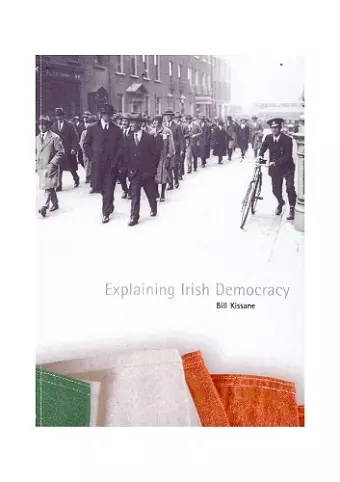Explaining Irish Democracy
Format:Hardback
Publisher:University College Dublin Press
Published:14th May '02
Currently unavailable, and unfortunately no date known when it will be back

This is a systematic account of why Ireland remained democratic after independence. Bill Kissane analyzes the Irish case from a comparative international perspective and by discussing it in terms of the classic works of democratic theory. Each chapter tests the explanatory power of a particular approach, and the result is a mixture of political history, sociology, and political science. Taking issue with many conventional assumptions, Kissane questions whether Irish democracy after 1921 was really a surprise, by relating the outcome to the level of socio-economic development, the process of land reform, and the emergence of a strong civil society under the Union. On the other hand, things did not go according to plan in 1922, and two chapters are devoted to the origins and nature of the civil war. The remaining chapters are concerned with analyzing how democracy was rebuilt after the civil war; Kissane questions whether that achievement was entirely the work of the pro-Treatyites. Indeed, by focusing on the continued divisiveness of the Treaty issue, the nature of constitutional republicanism, and the significance of the 1937 constitution, Kissane argues that Irish democracy was not really consolidated until the late 1930s, and that that achievement was largely the work of de Valera.
"A masterly and reasonably accessible study of the birth and development of the Free State ... His statistics throughout are fascinating." Books Ireland Summer 2002 "This book will...serve a useful purpose in that it will suggest further areas of research, into areas such as the origins of the civil war, and the role of the British in that context." Irish Democrat Oct/Nov 2002 "contains a very good exploration of the development of pre-independence civil society, and suggests plausibly that a combination of British constitutional values, British associational culture and the civil-society-encouraging nature of the British state itself, played key roles in laying strong foundations for Irish democratic consolidations ... this remains a book which makes a very helpful contribution to ongoing debates about the emergence and consolidation of Irish democracy." Irish Political Studies 18 (1) 2003 "This is a welcome and long overdue study of how Irish democracy was successfully stabilised and consolidated." Nations and Nationalism 9 (4) 2003 "an excellent and thought-provoking work which deserves a wide readership among those interested in Irish politics and history, democratic theory, democratization processes and comparative politics in the most general sense." Democratization 2003 "Addressing readers with a basic knowledge of Irish politics, Kissane's arguments are well reasoned, clearly stated and readily accessible to critical appraisal ... provides a solid foundation for a new and promising path of enquiry." Allan Zink, Strasbourg West European Politics 2003 "A fascinating study, theoretically sophisticated and empirically rigorous, this book is essential for anyone interested in democratisation in general and in Irish democratisation in particular ... it demonstrates the utility of adopting the comparative method in the analysis of a particular case and the always potentially creative tension between the general and the particular." Irish Studies Review 12 (3) 2004
ISBN: 9781900621694
Dimensions: unknown
Weight: unknown
304 pages